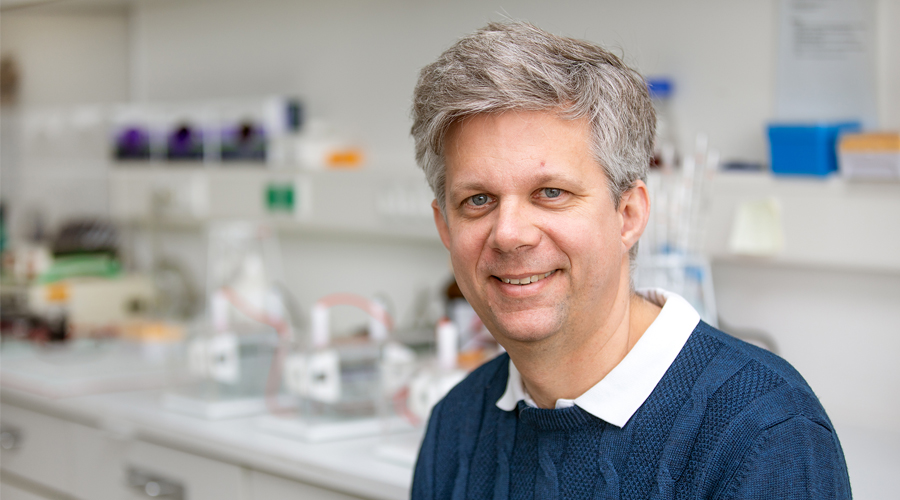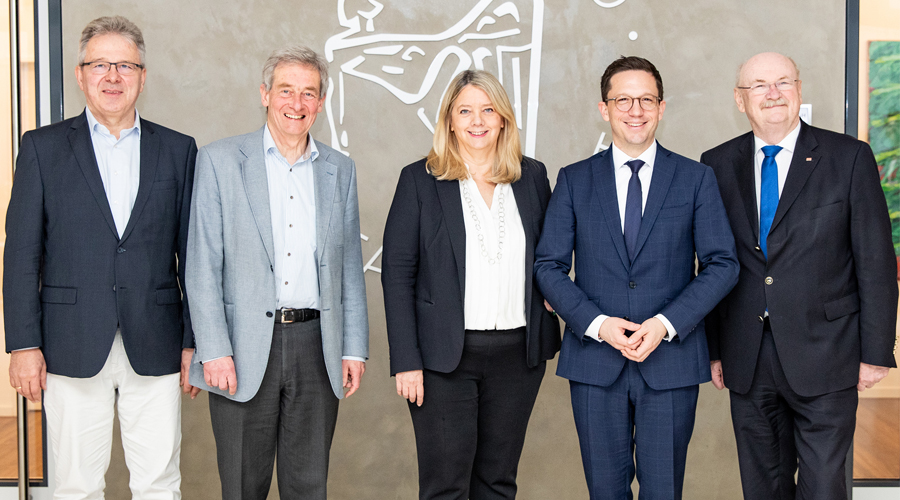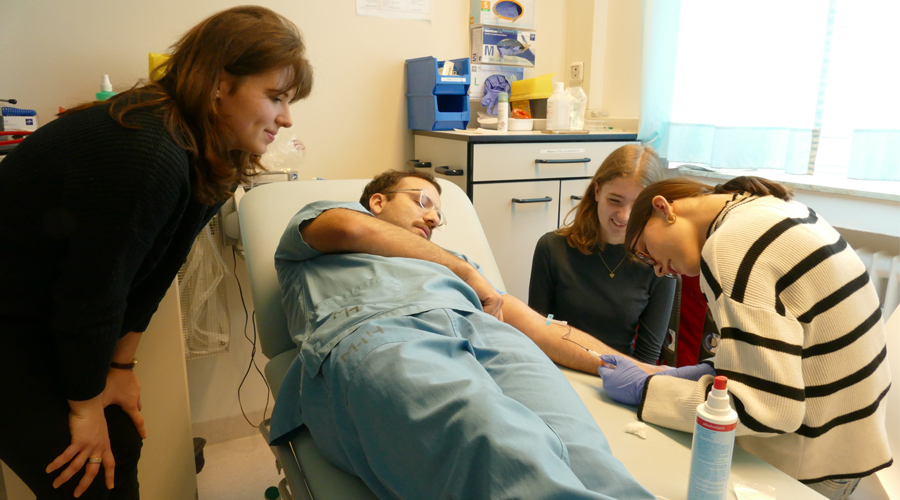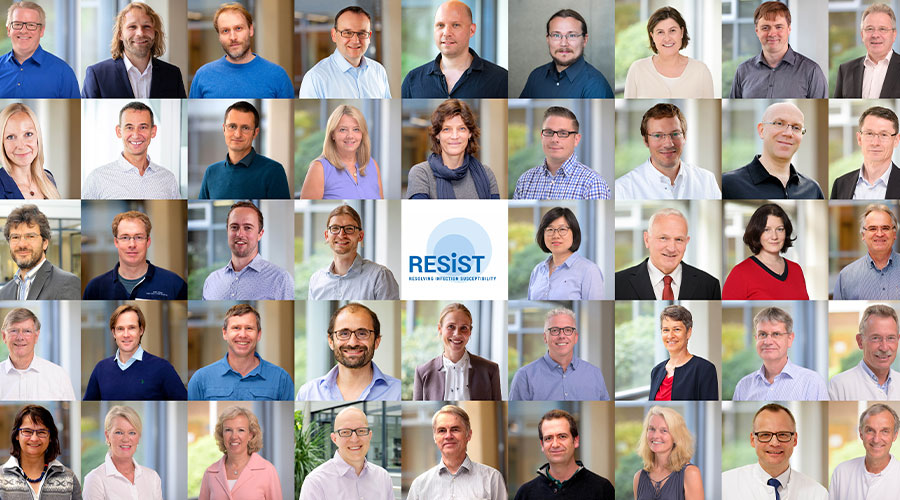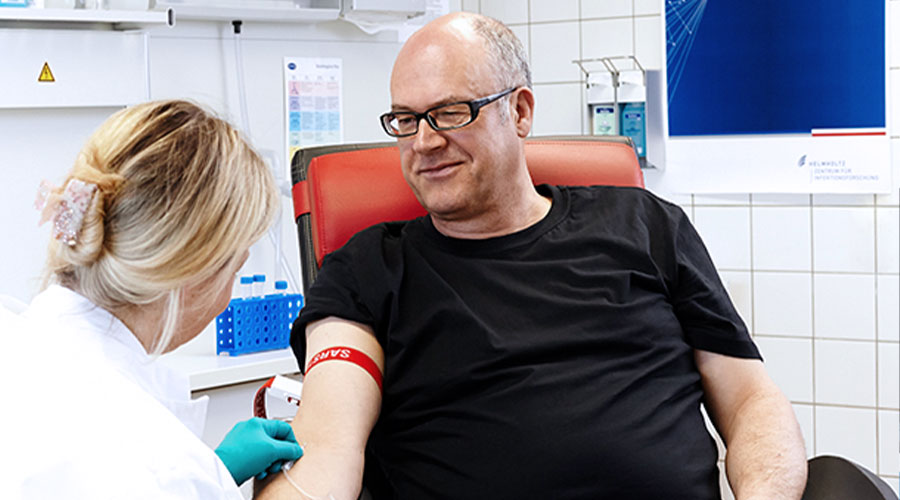






Research to help the most vulnerable
Some people become only mildly ill when they ’catch’ viral or bacterial infections, whereas others are affected much more severely. But what are the reasons for these differences? And how can the course of a disease be predicted and personalised treatments developed?
These questions are being addressed by the RESIST Cluster of Excellence team. This will enable them to help people with a weakened immune system, including newborn babies, the elderly, people with congenital immunodeficiency, those whose immune system is suppressed for therapeutic reasons, and implant users.
Our research programme is for the weakest. The coronavirus pandemic has clearly shown how important the goal of our Cluster of Excellence RESIST is to better understand the different susceptibility of individuals to infections in order to protect individuals as well as possible.
RESIST – News
General Meeting
April 23, 2024
April 23, 2024
April 23, 2024
The RESIST members' meeting on 17 April 2024 in Lecture Hall Q, which was attended by around 30 members and in which other members took part online, provided an [...]
The RESIST members' meeting on 17 April 2024 in Lecture Hall Q, which was attended by around 30 members and in which other members took part online, provided an [...]
The RESIST members' meeting on 17 April 2024 in Lecture Hall Q, which was attended by around 30 members and in which other members took part online, provided an opportunity to meet again, catch up and exchange ideas. During the meeting, Prof Schulz reported that a member of the [...]
Welcome Prof. Dölken
April 21, 2024
April 21, 2024
April 21, 2024
We welcome Professor Dr. Lars Dölken as a new member of RESIST. The specialist in herpes viruses has been Director of the MHH Institute of Virology since 2 April [...]
We welcome Professor Dr. Lars Dölken as a new member of RESIST. The specialist in herpes viruses has been Director of the MHH Institute of Virology since 2 April [...]
We welcome Professor Dr. Lars Dölken as a new member of RESIST. The specialist in herpes viruses has been Director of the MHH Institute of Virology since 2 April 2024, succeeding Prof. Schulz, who has headed the institute since 2000. Prof Dölken has also been a member of the [...]
Visit by the Minister
April 2, 2024
April 2, 2024
April 2, 2024
The RESIST speaker trio was delighted to welcome a distinguished visitor: Falko Mohrs, Lower Saxony's Minister for Science and Culture, visited the MHH on 21 March to find out [...]
The RESIST speaker trio was delighted to welcome a distinguished visitor: Falko Mohrs, Lower Saxony's Minister for Science and Culture, visited the MHH on 21 March to find out [...]
The RESIST speaker trio was delighted to welcome a distinguished visitor: Falko Mohrs, Lower Saxony's Minister for Science and Culture, visited the MHH on 21 March to find out more about our Cluster of Excellence RESIST. Prof Manns received the Minister as well as Julia Streuer, Leon Schmalstieg and [...]
General Meeting
April 23, 2024
April 23, 2024
April 23, 2024
The RESIST members' meeting on 17 April 2024 in Lecture Hall Q, which was attended by around 30 members and in which other members took part online, provided an [...]
The RESIST members' meeting on 17 April 2024 in Lecture Hall Q, which was attended by around 30 members and in which other members took part online, provided an [...]
The RESIST members' meeting on 17 April 2024 in Lecture Hall Q, which was attended by around 30 members and in which other members took part online, provided an opportunity to meet again, catch up and exchange ideas. During the meeting, Prof Schulz reported that a member of the [...]
Welcome Prof. Dölken
April 21, 2024
April 21, 2024
April 21, 2024
We welcome Professor Dr. Lars Dölken as a new member of RESIST. The specialist in herpes viruses has been Director of the MHH Institute of Virology since 2 April [...]
We welcome Professor Dr. Lars Dölken as a new member of RESIST. The specialist in herpes viruses has been Director of the MHH Institute of Virology since 2 April [...]
We welcome Professor Dr. Lars Dölken as a new member of RESIST. The specialist in herpes viruses has been Director of the MHH Institute of Virology since 2 April 2024, succeeding Prof. Schulz, who has headed the institute since 2000. Prof Dölken has also been a member of the [...]
Visit by the Minister
April 2, 2024
April 2, 2024
April 2, 2024
The RESIST speaker trio was delighted to welcome a distinguished visitor: Falko Mohrs, Lower Saxony's Minister for Science and Culture, visited the MHH on 21 March to find out [...]
The RESIST speaker trio was delighted to welcome a distinguished visitor: Falko Mohrs, Lower Saxony's Minister for Science and Culture, visited the MHH on 21 March to find out [...]
The RESIST speaker trio was delighted to welcome a distinguished visitor: Falko Mohrs, Lower Saxony's Minister for Science and Culture, visited the MHH on 21 March to find out more about our Cluster of Excellence RESIST. Prof Manns received the Minister as well as Julia Streuer, Leon Schmalstieg and [...]
UniStem Day
March 22, 2024
March 22, 2024
March 22, 2024
At this year's UniStem Day on 22 March at the MHH, which was organised by RESIST Professor Lachmann, PD Dr. Ruth Olmer and Dr. Sylvia Merkert, 24 students were [...]
At this year's UniStem Day on 22 March at the MHH, which was organised by RESIST Professor Lachmann, PD Dr. Ruth Olmer and Dr. Sylvia Merkert, 24 students were [...]
At this year's UniStem Day on 22 March at the MHH, which was organised by RESIST Professor Lachmann, PD Dr. Ruth Olmer and Dr. Sylvia Merkert, 24 students were able to experience stem cell research first-hand. In the middle of the Easter holidays, they came to the MHH, where [...]
General Meeting
April 23, 2024
April 23, 2024
April 23, 2024
The RESIST members' meeting on 17 April 2024 in Lecture Hall Q, which was attended by around 30 members and in which other members took part online, provided an [...]
The RESIST members' meeting on 17 April 2024 in Lecture Hall Q, which was attended by around 30 members and in which other members took part online, provided an [...]
The RESIST members' meeting on 17 April 2024 in Lecture Hall Q, which was attended by around 30 members and in which other members took part online, provided an opportunity to meet again, catch up and exchange ideas. During the meeting, Prof Schulz reported that a member of the [...]
Welcome Prof. Dölken
April 21, 2024
April 21, 2024
April 21, 2024
We welcome Professor Dr. Lars Dölken as a new member of RESIST. The specialist in herpes viruses has been Director of the MHH Institute of Virology since 2 April [...]
We welcome Professor Dr. Lars Dölken as a new member of RESIST. The specialist in herpes viruses has been Director of the MHH Institute of Virology since 2 April [...]
We welcome Professor Dr. Lars Dölken as a new member of RESIST. The specialist in herpes viruses has been Director of the MHH Institute of Virology since 2 April 2024, succeeding Prof. Schulz, who has headed the institute since 2000. Prof Dölken has also been a member of the [...]
Visit by the Minister
April 2, 2024
April 2, 2024
April 2, 2024
The RESIST speaker trio was delighted to welcome a distinguished visitor: Falko Mohrs, Lower Saxony's Minister for Science and Culture, visited the MHH on 21 March to find out [...]
The RESIST speaker trio was delighted to welcome a distinguished visitor: Falko Mohrs, Lower Saxony's Minister for Science and Culture, visited the MHH on 21 March to find out [...]
The RESIST speaker trio was delighted to welcome a distinguished visitor: Falko Mohrs, Lower Saxony's Minister for Science and Culture, visited the MHH on 21 March to find out more about our Cluster of Excellence RESIST. Prof Manns received the Minister as well as Julia Streuer, Leon Schmalstieg and [...]
Upcoming Seminars

RESIST Seminar guest lecture by Prof. Quirin Hammer
6. June 2024 | 17:00 - 18:00
6. June 2024 | 17:00 - 18:00
6. June 2024 | 17:00 - 18:00
Exciting topics, interestingly presented: Every first and third Thursday (except during school holidays), RESIST scientists or top-class researchers from external institutions present their topics at the RESIST seminar series. [...]
Exciting topics, interestingly presented: Every first and third Thursday (except during school holidays), RESIST scientists or top-class researchers from external institutions present their topics at the RESIST seminar series. [...]
Exciting topics, interestingly presented: Every first and third Thursday (except during school holidays), RESIST scientists or top-class researchers from external institutions present their topics at the RESIST seminar series. Attend these exciting seminars of the Cluster of Excellence RESIST, as a member of RESIST or as a colleague or [...]
13. June 2024 | 17:00 - 18:00
19. June 2024 | 17:00 - 18:00
Film Portrait of the Cluster of Excellence RESIST
Doctoral Studies
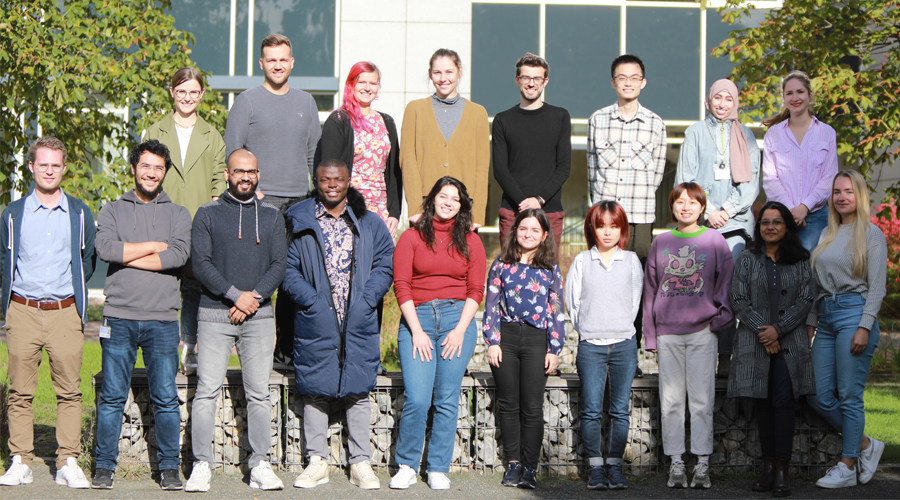
RESIST is happy to support students of natural sciences or medicine in their doctoral studies – both in terms of research and other challenges. For more information click here.


